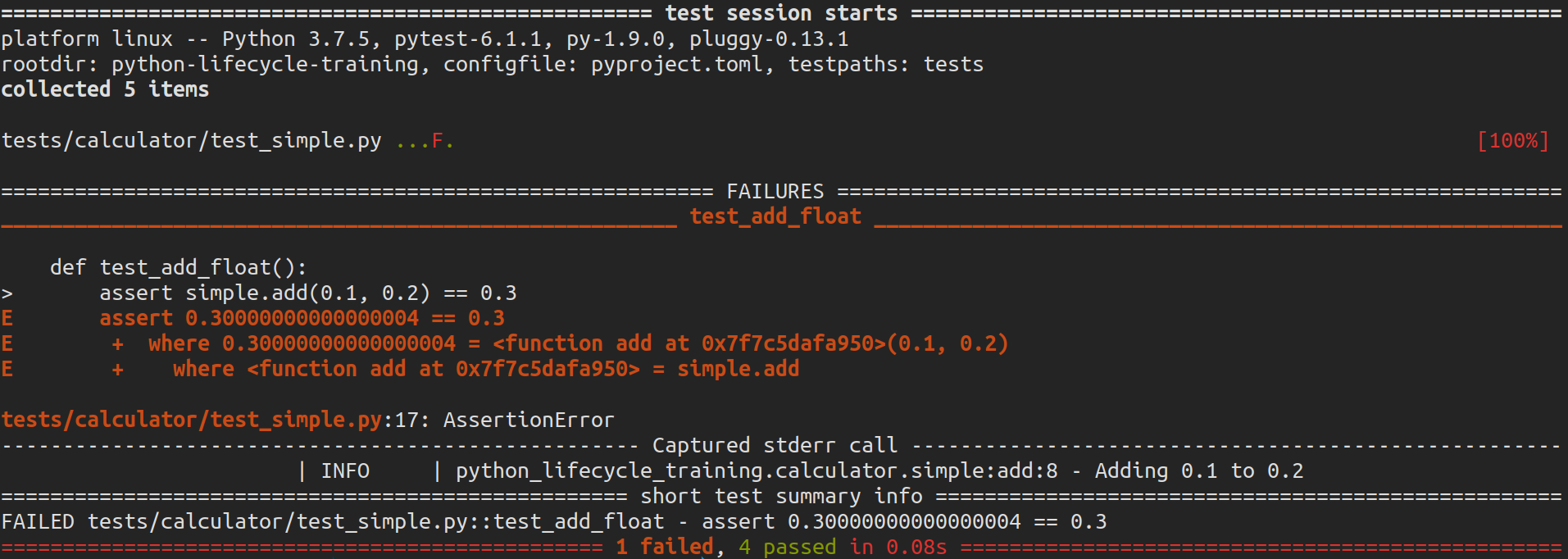Testing: pytest
The pytest framework makes it easy to write small tests, yet scales to support complex functional testing for applications and libraries.
Detailed info on failing assert statements (no need to remember self.assert* names)
Auto-discovery of test modules and functions
Modular fixtures for managing small or parametrized long-lived test resources
Can run unittest (including trial) and nose test suites out of the box
Python 3.5+ and PyPy 3
Rich plugin architecture, with over 315+ external plugins and thriving community
For more information visit https://docs.pytest.org/en/stable/
Installation
$ poetry add pytest --dev
Configuration
Add the following in pyproject.toml:
[tool.pytest.ini_options]
testpaths = "tests"
Usage
Let’s write a test for the simple calculator in test_simple.py
from python_lifecycle.calculator import simple
def test_add():
assert simple.add(1, 2) == 3
Note
You can replace the version test and remove the variable __version__ from
your package init file
To execute pytest run:
$ pytest

pytest will run all files of the form test_*.py or *_test.py in the current
directory and its subdirectories. Thus we can write any sort of tests we want.
from python_lifecycle_training.calculator import simple
def test_add_positives():
assert simple.add(1, 2) == 3
def test_add_negatives():
assert simple.add(-1, -2) == -3
def test_add_mixed():
assert simple.add(1, -2) == -1
def test_add_float():
assert simple.add(0.1, 0.2) == 0.3
def test_add_str():
assert simple.add("hello ", "world") == "hello world"
Run test:
$ pytest

Whoops! Something doesn’t seem right.
We need to handle float values a little differently when writing tests. We just need to check whether the value obtained is close enough.
import pytest
def test_add_float():
assert simple.add(0.1, 0.2) == pytest.approx(0.3)
Now run the tests again.
$ pytest

All tests have passed. Congratulations!
There is, however, one more thing to notice here. The tests passed for “hello world” as well even though we’ve explicitly said that the method add takes nothing but real numbers. This is because Python computes the types dynamically and type check is just a convention we use for the ease of code maintenance and future development.
Advanced feature
We can represent all these tests by a single test method with different test params.
import pytest
from python_lifecycle_training.calculator import simple
def isfloat(num):
return isinstance(num, float)
@pytest.mark.parametrize(
"a, b",
[
(1, 2),
(-1, -2),
(1, -2),
(0.1, 0.2),
("hello ", "world"),
],
)
def test_add(a, b):
expected = a + b
if any(map(isfloat, (a, b))):
expected = pytest.approx(expected)
assert simple.add(a, b) == expected
Pre-commit
We can run tests before every commit by adding the following in
.pre-commit-config.yaml file:
- repo: local
hooks:
- id: install-dependencies
name: Install Dependencies
entry: poetry install
language: python
always_run: true
pass_filenames: false
- id: test
name: Run tests
entry: poetry run pytest
language: python
always_run: true
pass_filenames: false
Next Step
To move on to the next step commit or stash your changes then checkout to the branch
setup/test/coverage
$ git stash
$ git checkout setup/test/coverage
Uninstall
$ poetry remove pytest --dev